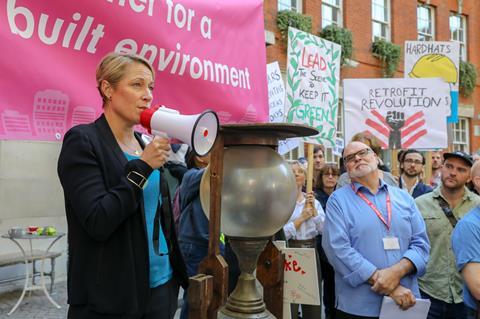UKGBC boss says chancellor was ‘silent’ on construction’s carbon emissions
Industry experts have joined a growing backlash against Rishi Sunak’s failure to set out more green measures in last week’s Budget.
Construction trade bodies have criticised the chancellor for not including a national retrofit strategy in his announcement despite the government pledging a “green industrial revolution” in November last year.

Sunak also made no mention of the government’s flagship £3bn Green Homes Grant scheme for energy efficiency improvements to homes, which has been widely criticised for its low uptake among both householders and construction firms.
UK Green Building Council chief executive Julie Hirigoyen said the Budget had been “silent” on addressing construction’s contribution to carbon emissions.
> Opinion: What the budget says about green priorities
> Also read: CLC to push for national retrofit strategy after Budget silence
She told Building: “The chancellor unveiled a whole range of instruments to restart the economy after the pandemic – from retraining schemes to tax incentives - but unfortunately he missed the chance to tie these directly to achieving a net zero transition and to the ‘green industrial revolution’ we have been promised.”
“The Budget was silent on addressing the carbon impact of the construction industry and the huge part that greening our buildings can play in delivering our post-covid economic recovery.”
She added: “In the year of [the UK] hosting [climate change conference] COP, the UK should be investing in world-leading policies, not missing opportunities.”
Federation of Master Builders chief executive Brian Berry told Building he was “disappointed” there had been no mention of a national retrofit strategy in the Budget, adding: “It would have been nice to have a nod.”
He warned the government would miss its 2050 net zero targets unless something is done to improve the energy efficiency of existing housing stock, which currently accounts for 20% of the UK’s carbon emissions.
He added: “They’ve got to be ambitious about trying to put measures in place to deliver zero carbon, because we’re tackling new build but we’re not doing anything with our existing building stock.”
The comments come after British Property Federation chief executive Melanie Leech told The Times last week that Sunak had “missed a trick by ignoring calls to zero-rate VAT on repairs and maintenance of residential buildings”.
She added the policy “could have been the most impactful tax change to support the improvement of both the energy efficiency and health and safety standards of our homes”.
Boris Johnson upgraded his climate targets carbon cutting targets in December last year, pledging to cut the UK’s emissions by a further 15% by the end of the decade and claiming that the government was “taking the lead” in a global effort to fight climate change.
But the prime minister is now under pressure to explain why there was so little emphasis on green policies in the Budget given that the UK will host November’s UN climate change conference (COP26) in Glasgow.
Berry told Building: “What is [the government] going to do at COP26? What is the prime minister going to say when he stands on the world stage talking about climate change, is he going to talk about the Green Homes Grant scheme?”
Analysis by the Energy and Climate Intelligence Unit thinktank last month found that the Green Homes Grant will help just 8% of its target 600,000 households switch to renewable energy by the end of this month.
The Treasury has said it will remove £2bn of funding from the scheme this month, leaving just £320m until it comes to an end in March 2022.
At the current rate of approval, this means that a maximum of 124,000 households could be given grants for home improvements by the end of the scheme, which would be around 20% of the programme’s target households.
The scheme allows householders to apply for vouchers worth up to £10,000 to help pay for installation of energy efficiency improvements, including insulation and heat pumps.


























No comments yet